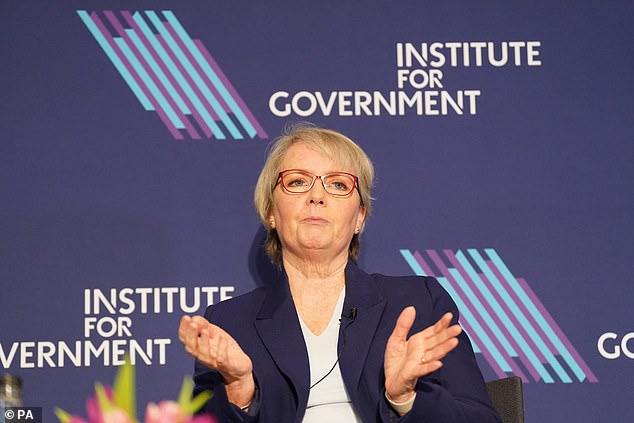Thank you for reading this post, don't forget to subscribe!
A health minister squirmed today as she refused to say which changing rooms transgender women should use in light of yesterday’s Supreme Court judgment.
Karin Smyth was also unable to answer directly when quizzed whether trans people should be treated on the same hospital wards as women.
The awkward exchanges follow yesterday’s Supreme Court ruling that the terms woman and sex in the 2010 Equality Act ‘refer to a biological woman and biological sex’.
This means that transgender women with a gender recognition certificate (GRC) can be excluded from single-sex spaces if ‘proportionate’.
Asked whether trans women should use female changing rooms, the minster told Times Radio: ‘Look I think we need to make sure that in this discussion we are following both the law so that is clear for women and for service providers and you know…this varies upon what the provision of those service providers are.
‘Large organisations, smaller organisations, many smaller organisations.’
Ms Smyth was questioned separately about the ruling’s impact on previous NHS guidance that trans people should be accommodated according to their legally recognised gender.
‘If I remember, the guidance you’re alluding to is an appendix to some previous guidance, and one of the issues, as I said earlier, that we are already looking at with the NHS is how they make sure that trans people are treated with privacy and dignity,’ she told BBC Breakfast.
‘But the ruling is very clear that sex means biological sex, and… the NHS will obviously be complying with that as every other public body will.‘
Karin Smyth was also unable to answer directly when asked whether trans people should be treated in the same room as women in hospitals
The Supreme Court decision has been hailed as a victory by campaigners, but LGBT charity Stonewall described it as ‘incredibly worrying for the trans community’.
In a separate interview with Sky News, Ms Smyth said it brought ‘clarity’ for women.
She was also asked if Rosie Duffield – the MP who left Labour over a row about the party’s stance on gender recognition – was owed an apology.
In response, Ms Smyth said she wished the now Independent MP ‘good luck’, but added Sir Keir Starmer had ‘changed the Labour Party on a number of issues and made us fit for purpose to face the electorate‘.
And questioned whether she thought the ruling would further inflame arguments, the minister said: ‘No, I really hope that it does draw a line under it by clarifying what sex means, by clarifying that people have different protected rights under the Equality Act and being very clear to all organisations what that means.’
NHS officials have confirmed they will consider the ruling as they update guidance on same-sex hospital wards.
Current NHS England guidance on the issue is laid out in a document from 2019 which says that ‘trans people should be accommodated according to their presentation: the way they dress, and the name and pronouns they currently use’.
Campaigners have said the judgment could have far-reaching consequences for sports and single-sex spaces such as changing rooms and hospital wards.
The justices said providers of single-sex spaces including changing rooms, homeless hostels and medical services would face ‘practical difficulties’ if the word ‘sex’ was interpreted as being wider than just biological sex in the 2010 legislation.

In a separate interview with Sky News, Ms Smyth said the ruling brought ‘clarity’ for women
Equality and Human Rights Commission (EHRC) chairwoman Baroness Kishwer Falkner has described yesterday’s ruling as ‘enormously consequential’ and vowed to pursue organisations which do not update their policies.
The ruling that the terms woman and sex in the 2010 Equality Act ‘refer to a biological woman and biological sex’ means transgender women with a gender recognition certificate (GRC) can be excluded from single-sex spaces if ‘proportionate’, the Supreme Court said.
Baroness Falkner said organisations should be ‘taking care’ to look at the ‘very readable judgment’ to ‘understand that it does bring clarity, helps them decide what they should do’.
Asked if it was now simple that trans women cannot take part in women’s sport, she told BBC Radio 4’s Today programme: ‘Yes, it is.’
On changing rooms and toilets, Baroness Falkner said: ‘Single-sex services like changing rooms must be based on biological sex.
‘If a male person is allowed to use a women-only service or facility, it isn’t any longer single-sex, then it becomes a mixed-sex space.
‘But I have to say, there’s no law that forces organisations, service providers, to provide a single-sex space, and there is no law against them providing a third space, an additional space, such as unisex toilets for example, or changing rooms.’
She suggested trans rights organisations ‘should be using their powers of advocacy to ask for those third spaces’.

For Women Scotland directors Susan Smith (left) and Marion Calder (right) celebrate the landmark ruling
The commission is expecting to lay an updated statutory code of practice before Parliament by the summer, and has said it is working ‘at pace to incorporate the implications of this judgment’ into the code for public bodies setting out their duties under the Equality Act.
Baroness Falkner said the commission evaluates when the law is not followed by organisations and can speak to those bodies, or ‘use enforcement, compliance tools or whatever, we will be continuing to do that’.
Regarding single-sex hospital wards, she said the NHS will ‘have to change’ their 2019 policy, which says that trans people ‘should be accommodated according to their presentation’.
Baroness Falkner said the court ruling means there is now ‘no confusion’ and the NHS ‘can start to implement the new legal reasoning and produce their exceptions forthwith’.
Officials said they were already updating the guidance but the judgment will be considered as they move forward.



